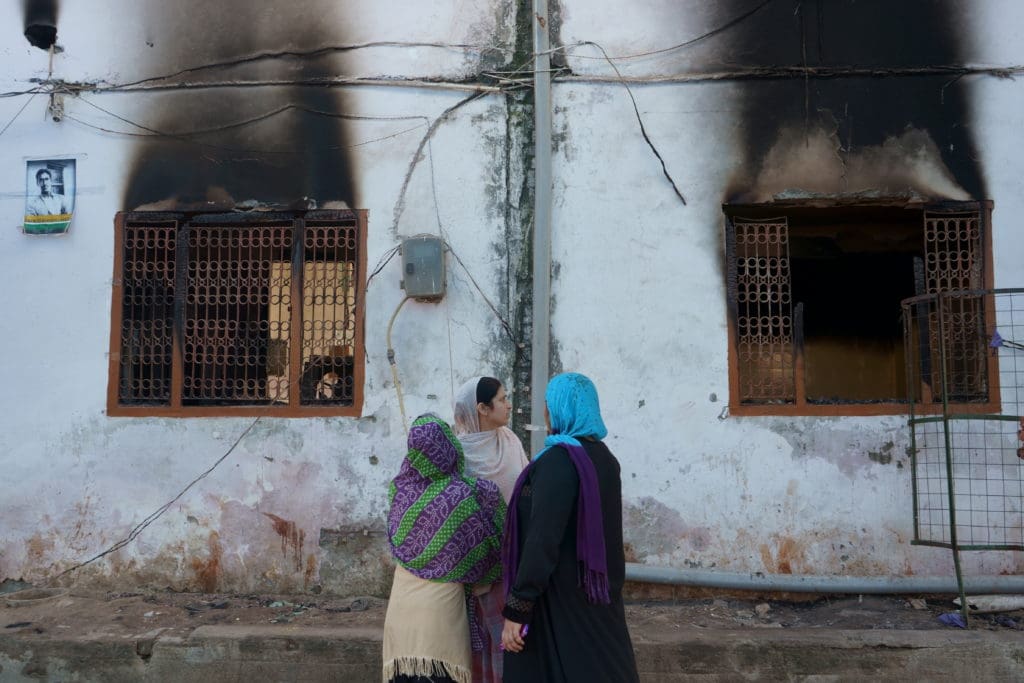
By Zafar Aafaq / Clarion India
NEW DELHI – Even as the Bharatiya Janata Party (BJP) has clinched a thumping victory in the just concluded assembly elections in four of the five states, some of the party’s rabid hate-mongers from Uttar Pradesh who are notorious for their anti-Muslim activities, including hate campaign and violence, got a drubbing at the hustings. Most of them failed to retain their respective seats.
The prominent names among these hate-mongers are Keshav Prasad Maurya, who is deputy chief minister of the outgoing cabinet, Sangeet Som, Umesh Malik and Suresh Rana. The trio faced police cases for their alleged role in fomenting violence against Muslims in the 2013 Muzafarnagar riots.
Maurya fell to Samajwadi Party’s Dr Pallavi Patel on Sirathu seat. He bagged 43.28% of the votes polled against 46.49% of Patel. His loss is a significant on many counts. He makes no bones about bolstering anti-Muslim rhetoric. In December, when a Hindutva mob attempted to storm a mosque in Mathura, he had put out a tweet, “Mathura ki tayyari hai.” Moreover, his clip of leaving a video interview with the BBC in a huff had gone viral. He was irked by questions posed to him by the reporter on whether he would condemn the Haridwar Dharam Sansad that saw open calls for genocide against Muslims.
As regards Maurya, it is being debated whether he will retain his coveted seat of Yogi’s deputy after the loss. He is an MLC.
Rana who was contesting for a second term on the Thana Bhawan seat in Shamli lost to Ashaf Ali of Rashtriya Lok Dal by around 13,000 votes. Apparently, Jat, Gujjar, Muslim votes consolidated in favour of Ali which led to the defeat of the incumbent Sugarcane minister in the outgoing ministry. It remains to be seen whether the defeated Rana will retain his position in the cabinet led by the firebrand monk.
Similarly, Som, who has a consistent record of spewing communal venom, lost to Samajwadi Party’s Atul Pradhan from Meerut’s Sardhana constituency.
Malik, a BJP MLA is an accused in the Muzaffarnagar riots, was defeated by Rajpal Singh Baliyan of RLD by over 8,000 votes from Budhana seat.
Both Rana and Som were MLAs from their respective seats when the riots broke out in 2013. They were arrested on charges of making provocative speeches and abetting violence by the then SP government. However, in the 2017 elections, they retained their seats and later the Yogi government decided to withdraw cases against them. In March 2021, the court accepted the government’s plea.
Of the 19 seats in the four Jat-dominated districts – Muzaffarnagar, Shamli, Baghpat, Meerut – the BJP managed to win only six seats. While on the one hand it is seen as victory of the unity stitched up among Jats, Gujjars and Muslims in a reconciliation process post riots, experts who have kept a watch on the region attributed the BJP debacle to the year-long farmers’ agitation on Delhi’s borders.
“The communities were divided on religious lines post riots, but the Kisan Andolan brought people together. It is because of the uprising that we are seeing an almost complete BJP washout,” said Nakul Singh Sawhney, a noted filmmaker and political observer whose documentary ‘Muzaffarnagar Baaqi Hai’ on the riots is widely acclaimed.
Prominent intellectual Makul Kesavan views the loss of these hate figures with a glimmer of hope that raises the possibility of anti-communal politics.
On Sunday, his column in Telegraph said: “There are examples of rabidly communal politicians being defeated in western Uttar Pradesh, a region that was starkly polarized by the Muzaffarnagar violence just a few years ago. Sangeet Som and Suresh Rana lost to SP-RLD candidates. The very fact that it’s possible to broker an alliance of Jat, Gujjar and Muslim voters in Sardhana suggests that it’s a mistake to see a communal mentality as a permanent condition.”
Another hate figure in Yogi cabinet, Anand Swaroop Shukla, lost from Bairia in Ballia Nagar district to SP’s Jai Prakash Anchal by close to 13,000 votes. During his campaign, he had sought ban on Azaan (Muslim call for prayer) in the state. He had asked Muslims to consider idol worship of Hindu deities like Rama and Shiva. During the Nizamuddin Markaz Covid fiasco in 2020, he had branded Tablighi Jamaat as “human bombs”.
Not just the western UP, the party has seen its key Hindutva figures losing in the east as well. For instance, Raghvendra Pratap Singh, BJP MLA from Domaryaganj in Sidharathnagar district, who weeks before the results, made headlines for his venomous remarks against Muslim, was defeated by Saiyada Khatoon of the SP by a thin margin of 771 votes. Khatoon had lost to Singh by mere 171 votes in 2017.
Singh had said in his speech that Hindus who would vote for non-BJP parties have Muslim blood in their veins. He had warned that if voted to win again, he would make Muslims stop wearing skullcaps and start wearing tilak. At another instance, he had said that “Miyan terrorism” had decreased since he became MLA. Miyan is an Urdu word for mister but it has attained a pejorative colour in India’s Islamophobic lexicon.
This sparked outrage with activists filing a complaint before the state Election Commission (SEC) against him for delivering hate speech in the election campaign.
This article first appeared on clarionindia.net





